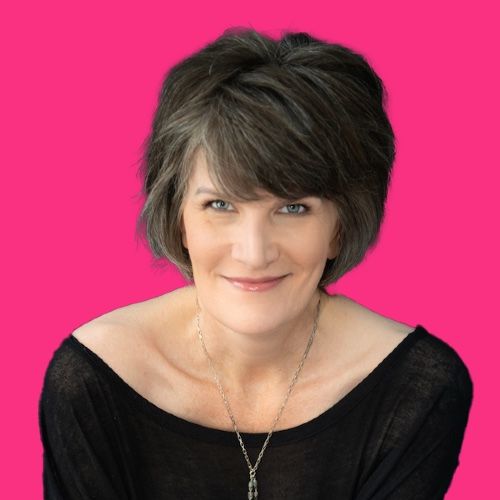106: Apple, AI Horrors, and the Entertainment Strikes
In this week’s news, we’re discussing a fabulous update in Apple Podcasts, a nasty AI future being put into place right now, and a bit about the writers and actors strikes—including how they relate to podcasting.
References:
“Snowpiercer’s Lena Hall Slams Body Scan Tech Ahead of Season 4”
--
Transcript
Welcome back to Podcast Launchpad. I'm Kelly. We've got three big items to discuss this week: updates on Apple Podcasts, AI, and the writers and actors strikes. Yes, they're related to podcasting. First up in Apple Podcasts, coming this fall when Apple releases iOS 17, listeners will finally see unique cover art for each episode,
Kelly [:that is, If you add unique episode cover art to your podcast hosting provider. I've been recommending that you do this since some other apps such as Spotify already display unique episode cover art. Now, from a practical perspective, it's also nice to have unique episode cover art for your website. If your podcast lives on a blog on your website, you want that individual cover art on your main podcast blog page for each episode post.
Kelly [:You can also use the episode cover art as the social sharing image that will show up in Google searches. Now remember that you can use just a variation of your regular podcast cover art for each episode. So that's what I do with mine. For each, for my solo episode, I just put the episode number and title on the regular podcast cover art.
Kelly [:And for guest episodes, I replace my photo with my guest's photo. Now this update for Apple Podcasts is really nice. It's taken them long enough to make this. Now we just have to wait for the release of iOS 17 coming out in the fall. Next up, AI. I did a series of episodes on AI in podcasting a few months ago.
Kelly [:I did a couple of solo episodes and I interviewed David Forman and John Mendez in two separate interviews. The bottom line of those episodes was that AI can be a powerful assistant in podcasting. We can use it to help us come up with questions to ask our guests, to help refine our writing, to help come up with titles, and other things like that.
Kelly [:I use Descript for most of my audio and video editing. And that, of course, uses AI to create transcriptions and improve sound and and other things. You can use AI services to create your titles, show notes, and blog posts. Descript and other services can even clone your voice to correct or replace words in your recording, or to create an entire recording, you know, an entire episode that's recorded, quote, in your voice. You know, it sounds like it's in your voice because you've cloned your voice.
Kelly [:So let's talk about that a bit. And that's going to take us into the entertainment industry strike. So you can clone your voice, write your podcast script or have AI write it for you, then use your cloned voice to record an episode without your ever speaking a word. So the whole episode can be 100% AI generated.
Kelly [:You can use AI generated music, AI generated cover art, AI generated show notes, episode title, blog posts, social media posts, YouTube description, and so on. I know of some podcasters who have already done that. I wish we were all sitting around together discussing this because I'd love to hear your thoughts on this topic. I really want to understand the thinking behind creating an AI generated podcast. Like 100% AI generated. If your voice works.
Kelly [:That is if your vocal coi, if your vocal chords are healthy and you're physically able to speak, why wouldn't you want to record the episode in your own voice? Even though we aren't sitting together in person or on Zoom, podcasting is meant to be fairly intimate. Yes, I'm speaking one to many. But, podcasting is supposed to feel like we're speaking one to one.
Kelly [:Using a cloned voice removes the human element from the show. Even if it's your own cloned voice, AI still can't put your emotion into it. At least not yet. Thank goodness, in my opinion. Now, if you lose your voice due to illness, then it would be great to have your cloned voice as a backup. If you permanently lose your voice, same thing, awesome to have your cloned voice so you can keep podcasting in your voice, right?
Kelly [:In those cases, I would put a comment in the show notes that the voice is a clone and tell why you're doing it that way. If you're deaf and can't speak, or you can't speak for whatever reason, then licensing a voice or using one that comes preloaded and descript is fantastic. Absolutely anyone should podcast.
Kelly [:And I love that AI gives everyone that opportunity. So I am not dissing AI voices in general. You know, I'm not making this blanket, I'm not blanket disparaging AI voices. Okay? I'm, I'm picking on it on an individual level, if you will, or, or in specific kinds of cases. I do think that we need to license voices or use only the ones that come preloaded in our editing software.
Kelly [:And I do think that podcasts that use cloned or AI voices should be labeled as such. Wouldn't you want to know if what you were listening to was a real person or not? You know that song, Heart on My Sleeve, by Ghostwriter977 that was generated by AI to sound like Drake and The Weeknd? Honestly, I never listened to it, but people really believed that it was Drake and The Weeknd at first.
Kelly [:I mean, yeah, pretty cool that AI mimicked their voices, lyrics, and styles so accurately that it fooled everyone. But it's also pretty creepy. If I were a musician, I would not want people to be able to sell music with a version of my voice in it without my consent. That's pretty unethical, right? Now, I do not think that Ghostwriter977 was trying to sell the music.
Kelly [:I'm just thinking ahead at what other people... will be doing, or will try to do in the future. So let's take it a step further. How about using your image without your consent, or, you give consent and you get paid, but you get paid only $1,056 and someone else owns your image in perpetuity and can use it however they like,
Kelly [:and you never get paid for it again? That's what's happening in the entertainment industry. And it's one of the main sticking points in the actors strike. Studios had put it in the actors' union contract that actors would have to undergo full body scans, so motion capture, on any film that wanted to do it.
Kelly [:The actors would get pay only one day's wages, which is currently equal $1,056.
Kelly [:Then the studio would own the images indefinitely. And the studio could use the images in any form they like, however they like, forever, and never pay the actor again. So imagine a sort of innocuous scenario in which the studio just drops your image into a crowd in a film. And when I say image, I mean, like, they turn your motion captured image Into a person or an avatar in a film.
Kelly [:So now quote you appear as a person in a crowd in a film that saves the studio $1,056 a day per person in that crowd. Awesome for the studio. That saves them a ton of money. And it screws you over because now you're not getting that work. Now imagine that the studio puts your avatar in an actual role with nudity, and normally you wouldn't consent to do nudity.
Kelly [:Maybe they have your avatar say things you wouldn't normally consent to say in a film. The audience has no idea this isn't really you. Not only are you not getting paid, but your reputation has now been altered. From your perspective, ruined, right? In a wild, but totally possible future, imagine that the studio turns your avatar into a star.
Kelly [:That is, they, they turn your avatar into, you know, a, a blockbuster movie star, where... You get lead roles in these blockbuster hits. You, your avatar [00:10:00] gets lead roles in blockbuster hits and your avatar becomes world famous. I'm talking George Clooney famous. Right? Just massive, massive star mobbed wherever, if it were really you in real life, you would be mobbed by the paparazzi and fans wherever you go.
Kelly [:Red carpet star, but it's not you. It's your body capture, emotion capture put together as an avatar getting these lead roles. So how would this affect you as the real person? Could you benefit financially from this? How about getting endorsements from companies? Probably not. Why would a company pay you big bucks when they could pay the studio [00:11:00] less than what they would pay you to get the avatar?
Kelly [:Could you get some acting gigs? You know, theater, but probably not major roles. Film? I don't know. Oh, I could imagine the studio blocking you from doing anything that would compete with your avatar because your avatar is now a brand that they own. Couldn't you even imagine that they would trademark your name?
Kelly [:I read that the actress Cristela Alonzo trademarked her name and in the process found out that the studio had tried to trademark it right after she started the process. Trademark her name, her name. How messed up is that? Yes, I know that this is all in the future, but how far [00:12:00] into the future are we talking?
Kelly [:Studios only just started scanning actors' bodies, and they've already tried to put this clause into the actor's contract. So studios are indeed thinking ahead and trying to screw over actors in the process. The first digital computer was created in 1945, only 78 years ago, and now we carry entire computers that connect us to the world in our pockets.
Kelly [:W.O.P.R. From War Games, remember, almost seems quaint today. Technology is advancing exponentially, and we can't truly know where we'll be five years from now, much less indefinitely from now. So studios' demanding that actors sign over the perpetual rights to their digital images is really disgusting. If you haven't seen the latest season of [00:13:00] Black Mirror on Netflix, I highly recommend watching the first episode at least called Joan is Awful.
Kelly [:It deals with this exact issue beautifully. You can see it in action. Actress Lena Hall is a series regular on the series Snowpiercer. She posted on Twitter recently to share her experience and outrage about what happened before they started shooting season four, the upcoming season. She wrote that all the series regulars had to undergo full body scans with motion capture and emotion capture.
Kelly [:So, you know, capturing your emotions, your facial expressions. And when she asked what it was for, she said that the answer she was given was a bit vague and mostly had to do with special effects. No other details were given about how the images would be used that season or beyond. [00:14:00] She never signed anything.
Kelly [:She didn't give consent except she, I mean, she did it. She did the thing, but nothing was in writing. And she was horrified once she read about what was put into the actors' contract, the potential contract that was never signed, uh, that contained the, you know, full body scan part. What I've been sharing right now doesn't necessarily directly pertain to podcasting, but I think we all need to be conscientious about how we use AI since we just can't totally predict where it's heading, how people will use it, or how it will end up affecting us all as podcasters.
Kelly [:We have all of these books, movies, and TV shows that are futuristic and do give us an idea of where it can go. So let's be careful. The podcast hosting provider, Acast, released a study they did recently on how [00:15:00] listeners feel about AI in podcasting. They surveyed 400 people who listen to podcasts weekly.
Kelly [:Listeners in the survey are totally cool with podcasters using AI to generate transcripts, improve sound, create captions for video, come up with titles and show notes, and even get help with creating content. Now something that really surprised me and really, really bothers me is that 53% of the people in the survey are fine with podcasters using AI to clone celebrities voices,
Kelly [:without their consent, as if they were appearing on the show, or clone famous people to seem like they were having a debate on the show. I don't find this appropriate at all. I would hate it if I were a listener of the show. I would be pissed off if I were someone being cloned or mimicked and [00:16:00] I would probably, I know I would, send a cease and desist letter if I were somebody who were being cloned or mimicked on a show.
Kelly [:Now an interesting bit from that Acast Survey is that 64% of listeners in that survey were also supportive of using AI to generate truth scores or to detect false statements in podcasts. Fascinating. So do the listeners who are cool with fake celebrity voices think that such episodes deserve a negative truth score?
Kelly [:I wonder about that. So, last thing before we end up here, also about the strike. If you're a member of the Writers Guild of America, you're on strike, of course, and more power to you. I hope you get everything that you want and deserve. If you have a podcast that's fiction or narrative and you're a member of the WGA, then your podcast is on hold, [00:17:00] too.
Kelly [:If you are not a member of the WGA, but your podcast is fiction or narrative... Think about if you ever want to join the WGA, because if you do, you should probably put your show on hold during the strike so that you don't appear to be a scab, you know, breaking or crossing the picket line. And same thing if you think you may ever want to join SAG AFTRA, the Actors Union, if your show is narrative or fiction and you are acting, what you are speaking on your show, if you consider yourself an actor and you may want to join SAG AFTRA one day, consider what you're doing on the show right now
Kelly [:and if you feel like you may be breaking the picket line. If you interview actors on your show, then you are out of luck during the actor strike. Members of SAG AFTRA are prohibited from appearing on podcasts during the strike. [00:18:00] So don't even reach out to them or their agents right now. Let's just respect the strike and wish them luck in getting everything they need and want.
Kelly [:That is it for today. Be sure to follow the show so you don't miss a single episode. And I, the real me and my voice, will see you next time on podcast launchpad.




